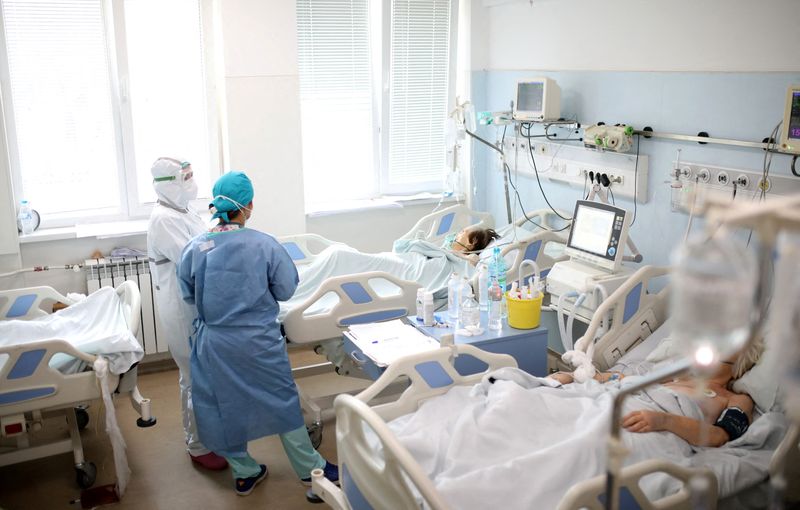By Nancy Lapid
(Reuters) -The risk of death, hospitalization and serious health issues from COVID-19 jumps significantly with reinfection compared with a first bout with the virus, regardless of vaccination status, a study published on Thursday suggests.
"Reinfection with COVID-19 increases the risk of both acute outcomes and long COVID," said Dr. Ziyad Al-Aly of Washington University School of Medicine in St. Louis. "This was evident in unvaccinated, vaccinated and boosted people."
The findings were drawn from U.S. Department of Veterans Affairs (VA) data collected from March 1, 2020 through April 6, 2022 on 443,588 patients with one SARS-CoV-2 infection, 40,947 with two or more infections, and 5.3 million noninfected individuals. Most of the study subjects were male.
Reinfected patients had a more than doubled risk of death and a more than tripled risk of hospitalization compared with those who were infected with COVID just once. They also had elevated risks for problems with lungs, heart, blood, kidneys, diabetes, mental health, bones and muscles, and neurological disorders, according to a report published in Nature Medicine.
"Even if one had prior infection and was vaccinated - meaning they had double immunity from prior infection plus vaccines - they are still susceptible to adverse outcomes upon reinfection," Al-Aly, the study leader, said.
People in the study with repeat infections were more than three times more likely to develop lung problems, three times more likely to suffer heart conditions and 60% more likely to experience neurological disorders than patients who had been infected only once. The higher risks were most pronounced in the first month after reinfection but were still evident six months later, researchers found.
Experts not involved with the study said the VA population does not reflect the general population.
Patients at VA health facilities are generally older, sicker people and often men, a group that would typically have more than normal health complications, said John Moore, a professor of microbiology and immunology at Weill Cornell Medical College in New York.
The researchers said cumulative risks and burdens of repeat infection increased with the number of infections, even after accounting for differences in COVID-19 variants such as Delta, Omicron and BA.5.
However, Dr. Celine Gounder, an infectious disease epidemiologist and an editor-at-large at Kaiser Health News, said there seemed to be a "plateauing effect with multiple infections," with less of a jump in risk after the second infection.
"The good news there is that the better people are protected with immunity, likely the risk of developing some of the complications will be lower over time," she added.
Still, Al-Aly cautioned that people should not let their guard down.
"We had started seeing a lot of patients coming to the clinic with an air of invincibility," he told Reuters. "They wondered, 'Does getting a reinfection really matter?' The answer is yes, it absolutely does."
Ahead of the fast approaching holiday season with travel and indoor gatherings, "people should be aware that reinfection is consequential and should take precautions," he added.
